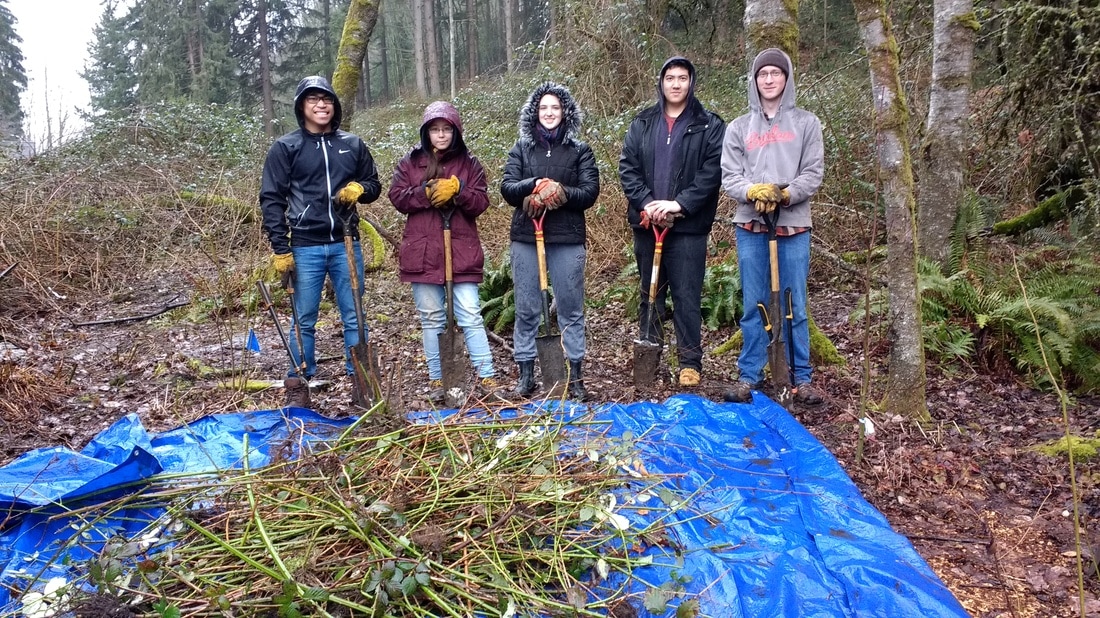|
On a crisp winter morning, students from the University of Washington Bothell begin to trickle up to the edge of the forest. They look about nervously, unsure of what to expect. As they fill out forms, they look at each other and begin to make connections. Greg, our Volunteer Coordinator, gives them a quick introduction to the organization and then they’re off on a hike to orient themselves in this 64-acre urban forest. Students then begin to hack their way deep into a salmonberry bush, seeking out rogue himalayan blackberry plants for removal. The students really get into it, working together to dig out the stubborn rhizomes and teaching each other what they know about the ecology of the plant. By the time they are done, the bonds are built, weaving the students to each other and to the plant community they are serving. The blood, sweat, and tears of their work mingle with the fresh scent of the rich soil and they are all smiles.The students are taking a course through the office of Community Based Learning and Research (CBLR). This means that with their regular course load, students work directly with community partners engaging in hands-on problem solving of real world problems. From their website, “We believe the very best form of education will engage students in the processes of learning about issues of public concern and gaining the knowledge, skills, and attitudes to address them.” For the students that choose to work with Friends of North Creek Forest, this means practicing restoration ecology and horticulture. They work with our stewardship team to combat invasive species, plant native trees, and other various odd jobs like watering and managing tools. All the while learning about the complexities of plant ecology, the sensitivity of forest edges, how to properly care for the vulnerable young plants, and many other ecological concepts that come up in our work.
With the financial support we’ve received from the Northwest Horticultural Society, we’ve been able to develop a detailed curriculum that better serves the needs of our students and helps to organize and connect the work we do across our different program areas, including research, stewardship, and education. This quarter, we were proud to offer a second level volunteer opportunity which provides another way for students to return to the forest while also developing valuable leadership experience. The position is designed for students who have already taken our restoration volunteer course, or otherwise have experience in horticulture and restoration ecology work. Students are training to be crew leaders; leading tool safety talks, orientation hikes, sharing their horticultural knowledge with our guests, setting up and cleaning up work parties, managing some volunteer logistics and practicing active community outreach. The position includes direct collaboration with our introduction restoration students and the UW-Restoation Ecology Network team. This partnership has been a wonderful connection for us. Not only do we get to engage with students who are learning the latest ecological theories, we also get some much needed help with the everyday work we do to meet our goals and mission. The partnership also gives us the opportunity to form the long-term volunteer relationships that are imperative to our work. Every quarter we see students return to volunteer on their own time. For students who move on to work and volunteer for other organizations, we are proud to sow the seeds of what they learn in Bothell. We are excited to evaluate the outcomes of this program as we work to keep pace with the needs of our students and community. We are thrilled to be able to share the long-lasting spiritual and scientific impacts that working in the soil and engaging with plant lives brings to our lives. We thank the Northwest Horticultural Society for supporting this work to encourage and train more stewards in the fields of restoration ecology and horticulture.
0 Comments
Leave a Reply. |
Categories
All
__Archives
March 2020
|


 RSS Feed
RSS Feed
